 Can you swim a boat that looks like she’s seen better days? Probably yes. Would you? Something tells me, not if you have a choice.
Can you swim a boat that looks like she’s seen better days? Probably yes. Would you? Something tells me, not if you have a choice.
A boat polish does nothing to make your boat more safe or faster. But it is crucial for making a boat look good. True, not everyone cares about the looks, but many people do. And they are right to do so.
A boat polish is not the last thing you use on the hull of your boat, but it’s the first thing that makes the first impression. You can bathe your boat in wax all you want, but if your boat is not appropriately polished, a wax job won’t do it any good. It’s still going to be the same old boat, only somewhat glossier and protected from water.
On the other hand, you can apply a polish and expect it makes everything better. A polish can only do so much, you need to do some preparation. That said, using a polish is one of the vital prep steps required to be taken to make your boat shine.
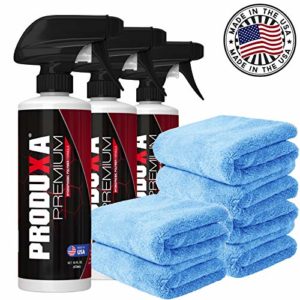
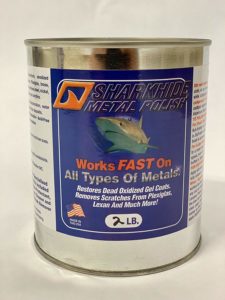
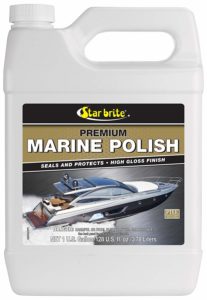
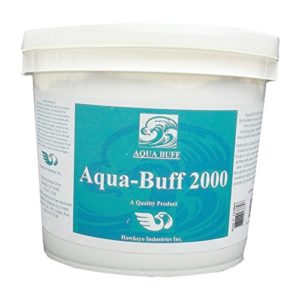
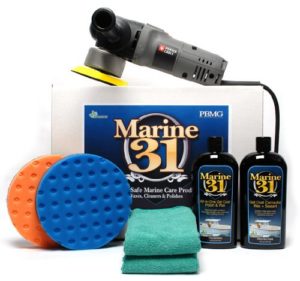
Top 5 Best Boat Polishes in 2019
1PRODUXA Shine Spray — Best Quick Fix Solution
The PRODUXA Shine Spray is a universal compound that offers an easy way out. It’s a combination of polisher, sealant, and protector that can be used on any vehicle or watercraft.
It’s not really compatible with power-buffing, and the container is too small to cover the entire hull of a huge marine boat, but it’s more than enough for patch jobs and polishing smaller boats.
As a polish, it is ultra-fine, which makes it hard to work off any significant defects. As a sealant, it’s nothing special, but it does offer protection from seawater thanks to its hydrophobic qualities, and reasonable UV protection in addition to high gloss and durability.
All in all, it is the best quick fix solution that does not require buffing.
- Universal compound. A combination of various compounds to achieve the best results
- Protection from seawater, as expected
- Reasonable UV protection
- High gloss and durability
- Ultra-fine polish
- Not really compatible with power-buffing
- Hard to work off any significant defects
2Sharkhide Metal Polish — Best Abrasive Polish for Metals and Windshields
If you want to get serious and happen to own a boat with a hull made of aluminum, you should definitely consider the Sharkhide Metal Polish. Metals are some of the most robust materials when it comes to polishing, which is why the polish must be up to the task.
It will deliver terrific results with any metal, not just aluminum. For metals, it is the best compound that you can use, and the two-pound container will be more than enough for any boat — or pontoon if you have a pontoon boat.
This Sharkhide polish cuts metals easily, but at the same time, it is capable of delivering scratch-free finish. It’s an abrasive polish, so you need to keep it in mind.
Not only does it work on metals, but it is also an excellent solution for lexan and plexiglass windshields. If you need them polished, you know what to do.
- Great for metals. Terrific results with any metal. The polish cuts metals easily
- An excellent solution for lexan and plexiglass windshields
- Capable of delivering scratch-free finish
- Abrasive polish. That means destructive polishing, no matter how little
3Star Brite Premium Marine Polish — All Purpose Boat Polish
If you need a good polish you can use on any surface, from fiberglass to metal, from painted surface to plexiglass, then the Star Brite Premium is the right polish for you.
You can even apply it over an old wax coat or polish.
This Marine Polish is more than just polish. Like the Produxa, it offers sealant protection and doubles as a marine wax. Which means it prevents UV damage and is perfect for protecting the hull from sea water.
Is it suitable for removing oxidation? Well, let’s just say it’s not that good of a polish. If you have zero oxidation, it will protect your boat from developing it. At the same time, you will be able to remove light oxidation without any problems. But if the situation is more serious, you’re going to run out of this polish before you remove the oxidation.
But it does provide high gloss.
That said, this product is more of a marine wax with polishing properties rather than a marine polish.
- Sealant protection
- Doubles as a marine wax. Get that high gloss as you polish the boat
- Perfect for protecting the hull from sea water. Wouldn't be much of a boat poslih without that
- Prevents UV damage. As expected from a marine product
- Can be used on any material
- Not that good of a polish. It’s great for protecting the hull, but when it comes to the polishing itself, the results could be better
4AQUA BUFF 2000 — Best Overall Boat Polish
Let’s say you have to get rid of heavy oxidation. Your boat is also made of fiberglass and covered with gelcoat. What to do?
Time to turn to buff compounds!
The Aqua Buff 2000 is exactly what you need to fight heavy oxidation and polish the surface, making it reflective and shiny. It works not just on fiberglass and gelcoat, but also metals and automotive paint – not that you will have to polish the latter if you’re only planning to work with your boat.
Forget about scratches, forget about oxidation, no matter how serious. With this buffing compound and a power buffer, your boat is going to shine like a star in less than an hour. If only it weren’t that pricey.
- Works not just on fiberglass and gelcoat, but also metals and automotive paint
- Removes oxidation
- Removes scratches
- Expensive
5Marine 31 Boat Polish & Wax Kit — Best Beginner’s Kit for Polishing a Boat
You’ve got yourself a fiberglass boat and don’t know where to begin? Don’t have anything prepared? Marine 31 has thought of all the problems you may run into.
If you’re utterly new to boat detailing, this set has everything you need. You get a power buffer from Porter Cable (7424XP Variable Speed Polisher, to be exact), a 16 oz container with Marine 31 Gel Coat Polish & Wax, and a 16 oz container with Marine 31 sealant. You will also get minor gear for polishing.
With this kit, it will take you minutes to remove oxidation and apply high gloss polish before sealing it with a UV resistant wax.
This set is the best polishing solution for beginners. But if you already have a power buffer, you would be better off with just Marine 31 boat polish or any of the 4 other polishes on my list.
- It will take you minutes to remove oxidation and apply high gloss polish before sealing it with a UV resistant wax
- A newbie-set. You will get a power buffer, a gelcoat polish and wax, and sealant and a few basic things you’d need for polishing
- If you already have a power buffer, you would be better off with just Marine 31 boat polish
Buyer’s Guide
Material
The first thing to consider is the material of the surface you’re polishing. With boats, that is likely to be fiberglass, gel coat, and aluminum. Paint can also be one of them.Interestingly enough, if you have a fiberglass boat, you may have to polish the fiberglass first, and lay some gel coat, then polish it before finally waxing. But that’s not likely, and here’s why.Polishing is meant to remove the defects and make the surface super smooth and sleek. If you’ve just polished the base surface and put some gel coat on it, it is unlikely that it is already due for some polishing. Yes, gelcoat oxidizes and sometimes polishing it is a must, but that takes time.Anyway, if you have a fiberglass boat, you really should buy a polish that is suitable for gel coat, not just fiberglass. Most boats are already coated in gelcoat after they are made. Aluminum, on the other hand, is different both from fiberglass and gelcoat. It’s metal, and it takes some potent stuff to cut it. Always pay attention to the labels. If your boat polish is designed for fiberglass and gelcoat and your boat is made from aluminum, the polish may be no better than a car polish in your situation, no matter how good it is otherwise.Universal Finishes
Universal finishes are a must when the hull of your boat comprises of more than one material is already coated with different materials. If you have a few painted spots on your aluminum boat, you need a polish that can handle both the metal and the paint. If you have a fiberglass boat with a worn gelcoat layer, you definitely need a polish that is good for both materials. The list can go on, but you have to remember that universal finishes are also more expensive.Active Ingredients
Although polishes are designed to be washed away after the job is done, sometimes they contain active substances that remain on the surface after the polishing is over.Some of the best boat polishes include UV protection. However, that kind of UV protection is not crucial if you plan on waxing your boat. A good boat wax will always offer enough UV protection to last a season or two. Or even more!Sometimes those extra ingredients create an extra coat that protects your boat. If that is the case, make sure you don’t overpay for the polish. Who knows, perhaps that extra layer won’t last too long, but it will cost you money, time, and every ounce of finish and wax you put onto the newly polished surface.Too Good Is Bad
Make sure that the polishing compound you buy is not too active. The stronger a polish is, the more abrasive it is. You only need extra abrasion to deal with particularly nasty defects. If all you want is to get rid of some small scratches or just make the surface extra-glossy, use a mild polish. The weaker the polish is, the better the end result will be. At least, if the polish is capable of cutting the surface at all.I recommend using non-abrasive polishes if you can help it. If not, it’s better to add some buffing compounds.Questions and Answers
If you polish your boat for the first time, it may be unnecessary. In most other situations, however, you will have to sand the boat before polishing it. Sanding will remove the worst oxidation and all the major defects. It will introduce minor imperfections instead, but those will be eliminated with polishing.
Not if your polish does not offer any protective coat. If yes, then you should definitely degrease the surface. You can use alcohol for that.
I strongly recommend that you use a power buffer regardless of the size of your boat. You can polish some of the least reachable spots manually, and you can use manual polishing for the first time, but generally, I recommend using power tools.
Absolutely. The boat will not be protected from oxidation if you polish it with most polishes as they do not contain any sealants — most of the time. It is perfectly normal since polishing is meant to remove oxidation and other defects, it’s not meant to protect the surface from acquiring the same marks anew. You don’t have to use natural waxes, though, a synthetic sealant will do the job just fine.
Sometimes, boat polishes include sealants, if that is the case, waxing the boat is not necessary. Then again, it’s better to be safe than sorry.
You can use car wax. However, it is suboptimal for a boat since watercraft are subjected to more harsh conditions than any car. So yes, you can, but that is not an optimal way to use car wax. You will end up wasting it.
As for car polish, the answer is no. Car polishes are entirely unsuitable for polishing boats, especially fiberglass boats.
